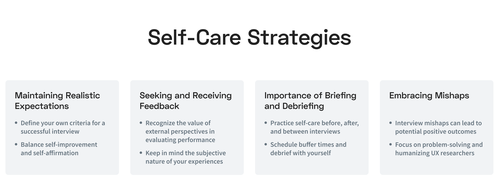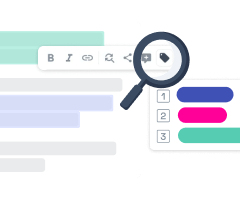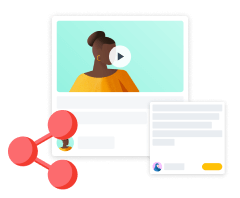
Caring for Mental Health in UX Research with 4 Essential Self-Care Strategies
Self-care and mental health awareness is a relevant topic for everyone. And caring for it is liable to benefit not only your life but also your work. In the case of UX researchers, caring for their mental health may even help them improve their user research outcomes. Since UX researchers frequently need to exercise compassion when interacting with people (i.e. research participants), it’s important for them to stay vigilant with their self-care. Otherwise, they can end up experiencing compassion fatigue.
A lack of self-care can manifest itself as self-neglect, self-sabotage, and excessive amounts of self-reservation. To avoid falling into these states of mind, it can be helpful to incorporate some self-care strategies into the way you work. Dominika Prikrylova, UX Researcher @Kontent.ai, shared four of her essential self-care strategies during our Meetup Talk to help her fellow UX researchers improve their mental health and workflow.
4 Essential Self-Care Strategies to Improve Mental Health
As UX researchers, it’s important to keep the well-being of participants in mind during user interviews so that they can leave the interviews in an improved or similar mood as when they entered.
Likewise, UX researchers should also be able to leave interviews in an improved or similar mood. It isn’t uncommon for the mood that researchers enter an interview with to set the tone for the whole interview. So taking care of your mental health benefits not only yourself but also your work by increasing the likelihood that you will set a good tone for the interview.
In the following sections are four self-care strategies that are essential to the maintenance of your mental health.

1. Maintain Realistic Expectations
It’s important to define the realistic criteria for a successful interview ahead of time. The keyword is “realistic”. This is important because it can often feel that people expect a lot from you. In actuality, no one demands more from you than yourself. So it’s important to determine what realistically needs to happen in order to consider an interview successful ahead of time, and then maintain those expectations.
That isn’t to say that you shouldn’t strive to improve your interview processes. But it’s often the case that practicing the act of affirming your strengths is way less common than fixating on your mistakes. So take the time to celebrate your strengths and successes as part of your self-care while working toward balancing self-improvement and self-affirmation.
/f/99166/2922x1588/01d17d6f04/snippet-1-screenshot.png)
2. Seek and Receive Feedback
It’s usually the case that our subjective experiences are the main thing that we focus on. So it’s important to keep in mind that our experiences are subjective in nature and that we may have a skewed view of things from our own perspective. Our subjective experiences can have an effect on our mental health. And on the flip side, our mental health can also have a direct impact on how we perceive our experiences. Therefore, it’s very helpful to seek out objective feedback and recognize the value of external perspectives in evaluating our performance.
We shouldn’t narrow our focus to what we may have done wrong. This thought pattern only leads downhill and can cause us to think that everything was a total disaster. Instead, we can get feedback from people who were not directly involved. This is a great practice to carry out on your team as giving and receiving constructive feedback can help you to see what areas actually need to be improved.
/f/99166/2924x1588/afc1354842/snippet-2-screenshot.png)
3. Importance of Briefing and Debriefing
It can be helpful for participants to be briefed before and after their interviews. These briefing and debriefing sessions give you the chance to establish trust with your interview participants, and it also gives you the chance to check up on the state of their mental well-being afterward. Which is more important than any research objective!
It is also incredibly helpful for UX researchers to brief and debrief themselves as a way of practicing self-care before, after, and between interviews. In fact, setting up buffer times between interviews is self-care 101! You need to schedule buffer times to take a break and also debrief with yourself, otherwise it can lead to self-neglect.
At the end of an interview, debriefing with yourself gives you the chance to glean some important insights. Debrief with yourself to summarize what went well, and what could have gone better. Taking this final step can help you to not overthink or overlook things.
/f/99166/2922x1582/0f1743a351/snippet-3-screenshot.png)
4. Embracing Mishaps as Learning Opportunities
Sometimes mistakes are just perceived mistakes. Other times, they are mistakes that we have actually made. But whether it’s accidentally mispronouncing a participant’s name or experiencing technical difficulties during interviews, mistakes happen. We all make mistakes! Which is why people are usually quite willing to overlook and forgive us for making them.
Interview mishaps can even lead to potential positive outcomes. For example, it may be the case that making a mistake humanizes you to your participants and makes them feel more relaxed during the interview.
The fear of making mistakes can be related to trying to seem impressive to participants in interviews. But instead of entering interviews with this mindset, focus on problem-solving and humanizing UX researchers. Acknowledge your mistakes and recognize that every stumble is an opportunity to try something new.
/f/99166/2924x1586/b508c8ce1b/snippet-4-screenshot.png)
Wrap-up
The nature of UX research is that it is emotionally demanding. Therefore, it is important to prioritize self-care and actively practice the four self-care strategies mentioned to help improve your mental health. This should be prioritized before trying to obtain better outcomes from your interviews because we are people first and UX researchers somewhere after that.
Furthermore, it is likely the case that prioritizing your mental well-being will consequently result in better outcomes. So it isn’t too much to say that being selfish is important in order to be selfless in UX research.
„We are people first and UX researchers somewhere after that.“
Watch recording 🎥
This article is based on a UX Research Meetup with Dominika Prikrylova, UX Researcher at Kontent.ai, that took place in September 2023. You can watch the full video here:
/f/99166/3328x1872/f1c4982a04/uxr-talk-dominika.png)






